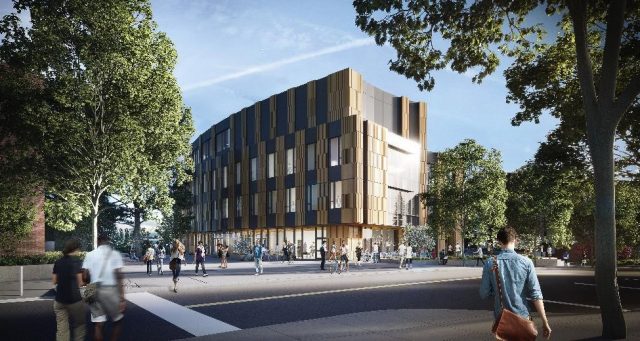Policy Spotlight: State investment needed to meet demand for engineers
Too many highly qualified students competing for too few slots: That’s the charge in a recent Seattle Times report that shed a spotlight on the UW’s engineering program. The UW has produced some of the region’s best and brightest engineering alums for generations, but for several years, demand has outpaced supply and students are being left out at a time when our economy desperately needs their skills.
In a March 2 editorial published in the Seattle Times, UW College of Engineering Dean Michael Bragg addressed this issue and put the focus on a key part of the solution: support from the State Legislature. Here’s an excerpt:
Nationally, Washington state is in an enviable position: Our region is expected to create 740,000 new jobs over the next five years. Many of these openings will require postsecondary education, especially in engineering. The state’s Connecting Washington transportation package and Sound Transit’s expansion will require more civil engineers. Bioengineers play a large role in the region’s prominence in biotech. Electrical engineers and computer scientists drive technological innovation and many types of engineers fuel the aerospace industry.
Yet, Washington state ranks 49th in the nation in the production of engineers, based on the size of our engineering workforce. We simply don’t have anywhere near the capacity needed in our universities to provide Washington students with the education required to qualify for those positions.
Student demand for engineering education is soaring. More than 2,000 incoming UW Seattle freshmen indicate an interest in an engineering major, up almost 50 percent over the past five years. But only about a third of those freshmen can be accommodated with current UW resources.
Our state has been very successful in promoting STEM programs in K-12 schools. More kids are graduating from high school with the passion and the qualifications to pursue higher education in STEM fields. STEM programs can be successful only if we build education as a system that begins in elementary school and continues through the university.
Thanks to past investments by the Legislature, industry, community and the University, the UW has been able to increase engineering enrollment by 40 percent over the past seven years, expand computer science facilities and grow diversity and access opportunities. We are currently asking the Legislature to invest $16 million in the next biennium to allow us to increase combined enrollment in high-demand fields across our three campuses (Bothell, Seattle and Tacoma).
###
Due to the program’s popularity, students have quickly outgrown the current decade-old home of the Computer Science and Engineering (CSE) program, the Paul G. Allen Center. The UW is currently in the process of fundraising and constructing a second building on the UW Seattle campus “CSE2“, which will allow CSE to double degree production. Fundraising efforts received a big boost just recently with a $50 million endowment that will establish the Paul G. Allen School of Computer Science & Engineering, moving CSE from a department to a school. $40 million of the endowment came from Paul Allen himself, and another $10 million from the Microsoft Corporation in Allen’s honor. The endowment will be used primarily for research, equipment and fellowships, and cannot be used to expand enrollment or the physical space. 
Other big name companies such as Zillow, Google, and Amazon have all pitched in between $5 and $10 million in recent months to help expand the UW CSE pipeline. The UW looked to the Legislature to match some of those private dollars, and received $17.5 million of its $40 million capital budget request in 2015 ($15 million was appropriated from the UW’s own building account for regular maintenance and repairs).
Expanding capacity to high-demand fields like computer science, engineering and science is a priority among all of Washington’s four-year public higher education institutions. Lawmakers are paying attention, and many, like the chair of the House Higher Education committee Rep. Drew Hansen (D-Bainbridge Island) have expressed a high interest, but they are facing many competing demands.
Ratcheting up the pressure from alumni might help lawmakers move the needle and find the funds for higher ed. More state investment could help loosen the bottleneck and provide life-changing opportunities for Washington’s young people and long-term benefits to our economy. Stories from engineering alums, parents of aspiring engineers and even business owners who need to hire engineers can all help illustrate why the UW can’t wait another session for the Legislature to act.
Do you have your own engineering story? Click here to share it with your lawmakers today. Personal stories from constituents have a great impact.